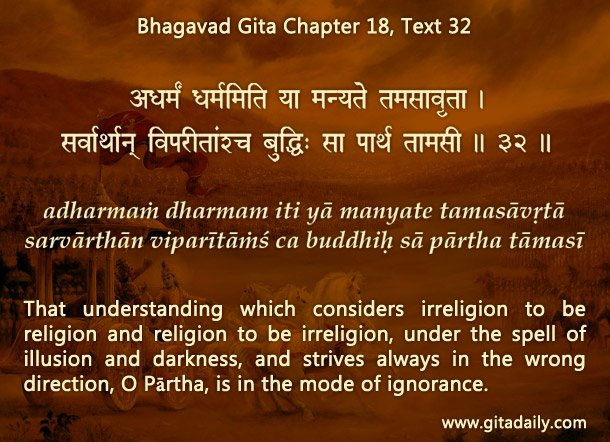Whenever we do something wrong, we feel bad, “I shouldn’t have done like that.” This bad feeling is the pinch of conscience. Conscience is like a mother; when a child does something dangerous such as go too close to a fire, she catches the child’s ear, “Don’t do that ever again.”
When we feel the pinch of conscience, we may try to get rid of the bad feeling by weakening our conscience. Such a conscience becomes like a weak mother who sees her child doing something dangerous, but can’t do anything protective.
Our conscience becomes weak if we expose ourselves to explicit sensual stimuli, indulge in them repeatedly and especially if we give in to the rationalizations that aim to normalize gross sensuality. The Bhagavad-gita (18.32) refers to such rationalizations as intelligence in the mode of ignorance – it sees things opposite of what they are. It deems the wrong right, labelling it as, say, trendy and liberating, and the right wrong, labelling it as, say, regressive and repressive.
When our conscience is weakened and silenced by rationalizations, we find ourselves rushing down a disastrous path of self-destructive indulgences that become increasingly immoral, reprehensible – and unconscionable. But unfortunately, we have no conscience left to tell us things as they are. Till the karmic consequences hit us, which is often unbearably painful.
To deal with the inner bad feeling, we can choose a healthier course of action – strengthen our willpower to resist the indulgences that activate our conscience’s reproach. Isn’t rejecting temptations too difficult? Yes, but the difficulty decreases if we practice bhakti-yoga diligently and connect ourselves with all-powerful Krishna.
Devotional connection with him grants us higher intelligence and taste. The higher intelligence sees through rationalizations, and the higher taste transforms right living from an austerity to a joy.
To know more about this verse, please click on the image
Explanation of article:
Podcast:
Download by “right-click and save”


“The higher intelligence sees through rationalizations, and the higher taste transforms right living from an austerity to a joy.”
…. Krishna Consciousness in a nutshell…
Only you could put it like this Prabhuji.
Dandavat pranam 🙂
Thank you – happy to be of service.
keep it up